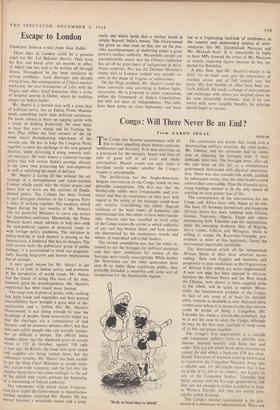Escape to London
CFIANCHAL SARKAR writes from New Delhi:
Three days in London could be a genuine relief for Mr. Lal Bahadur Shastri. They form his first real break after six months in office, of which one has had to be written off through illness. Throughout he has been restricted by serious problems: food shortages and sharply rising prices, the consequences of China's nuclear explosion, the near-breakdown of talks with the Nagas, and other, local headaches (like a strike of hospital interns in Delhi), which by tradition plague an Indian leader.
Mr. Shastri is a shrewd man with a great deal of political savvy, but an Indian Prime Minister needs something more than political astuteness. He needs always to buoy up sagging spirits with a touch of dashing leadership. He must think at least five years ahead and be framing the next Plan within the four corners of the (in some ways) disenchanting experience of the current one. He has to keep the Congress Party together to meet the challenge of the next general election, while chivvying it along towards radi- cal measures. He must weave a coherent foreign policy that will restore India's prestige abroad, at the same time preserving her non-alignment as well as satisfying the needs of defence.
Mr. Shastri is facing all this without the ad- vantage of a homogeneous and talent-studded Cabinet which could take the major strains and leave him to work on the outlines of funda- mental policy. The Cabinet has been formed to give divergent elements in the Congress Party a stake in sticking together. The tendency which Vegan 'during the last months of Mr. Nehru's rule for powerful Ministers to carve out niches for themselves continues. Meanwhile, the Prime Minister hasn't many advisers to help him with the non-political aspects of domestic issues or with foreign policy problems. The initiative in policy-making in such matters is passing to the bureaucracy, a tendency that has its dangers. The civil service lacks the politicians' grasp of public feelings; it is accustomed to think too pragmati- cally, leaving long-term and human implications out of account.
A very good reason for Mr. Shastri to get away is to look at Indian policy and problems in the perspective of world trends. Mr. Nehru had the knack of doing this most of the time, however great his preoctupations. Mr. Shastri's experience has been much more limited.
The steep rises in price of grains, milk, cooking fats, baby foods and vegetables and their general unavaildhility have brought a great deal of dis- satisfaction and a feeling that Mr. Shastri's Government is not doing enough 'to ease the hardships of people. Some economists might say that the shortages are a consequence of bad harvests and an intensive defence effort, but that does not satisfy people who can scarcely remem- ber so difficult a period. The official index number shows that the wholesale price of cereals stood at 152 in October, against 118 only a year ago. In Kerala,.the food riots have ended and supplies are being rushed there, but the sullenness remains. Mr. Shastri has been unable to get the State Chief Ministers to accept statu- tory nation-wide rationing, and the fact that the surplus States have not come willingly to the aid of the deficit ones marks perhaps the beginning of a weakening of federal authority.
The vehemence with which many Congress- men have urged the Government to manufacture nuclear weapons surprised Mr. Shastri. He has Veered between a moralistic stance and a prag- matie one which holds that a nuclear bomb is simply beyond India's means. The Government has given no clear lead on this, nor on the pos- sible accompaniment of sheltering under a great power's nuclear umbrella. Meanwhile, people are uncomfortably aware that the Chinese explosion has set off no great burst of indignation in Afro- Asian countries. Nor has the Defence Minister's recent visit to London yielded very notable re- sults in the shape of frigates or submarines.
On the Naga problem, Mr. Shastri's stand has been consistent and, according to Indian lights, reasonable. He is prepared to make concessions within the framework of India's Constitution, but will not hear of independence. The talks have been going on since September and have
led to a frightening backlash of intolerance in the country and unnecessary sniping at inter- mediaries like Mr. Jayaprakash Narayan and Mr. Michael Scott. It is remarkable in India to have MPs demand the arrest of Mr. Narayan (a widely respected figure) because he has ap- pealed for flexibility.
A pity, then, that Mr. Shastri's escape is so brief, for he must soon give the impression of resolute action and of full control over his party. His first months in office have been un- fairly difficult. He needs a change of environment and exchanges with others not weighed down by his own intractable problems. And if he can return with some tangible benefits, his prestige should begin to recover.


































 Previous page
Previous page